THE MUY CURIOSO TALE OF COLOMBIA’S SHOCK RECOGNITION OF PALESTINE
A day after Netanyahu cancels Bogota trip, outgoing president Santos secretly recognizes Palestine; Why? And will the new government reverse his decision?
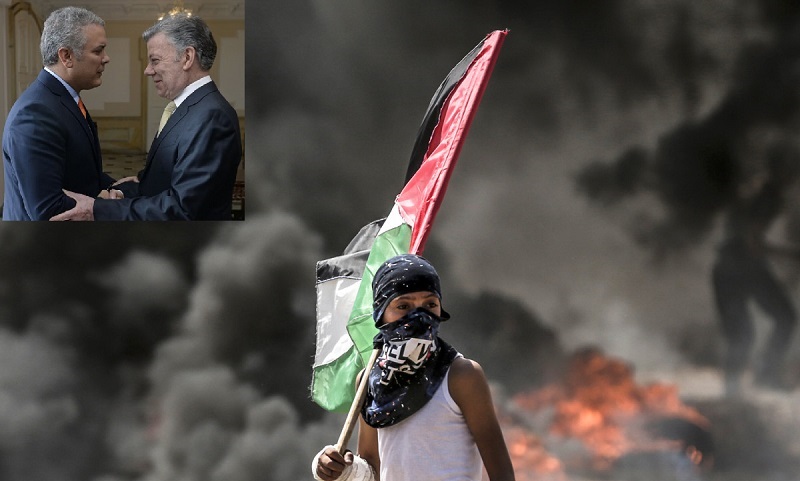
Duque y santos palestina
The muy curioso tale of Colombia’s shock recognition of Palestine*
A day after Netanyahu cancels Bogota trip, outgoing president Santos secretly recognizes Palestine; Why? And will the new government reverse his decision?

By Raphael Ahren **
10 August 2018
https://www.timesofisrael.com/the-muy-curioso-tale-of-colombias-shock-recognition-of-palestine/
@RaphaelAhren
The story of Colombia’s surprising recognition of Palestine is one of the most curious episodes Israeli diplomacy has seen in recent years. And it may not be over yet.
Nobody saw it coming. If anything, the South American country — Israel’s closest ally on the continent — was next on the list of nations expected to move their embassy from Tel Aviv to Jerusalem. Colombia’s new president, Ivan Duque, had vowed to further improve already close ties between Bogota and Jerusalem.
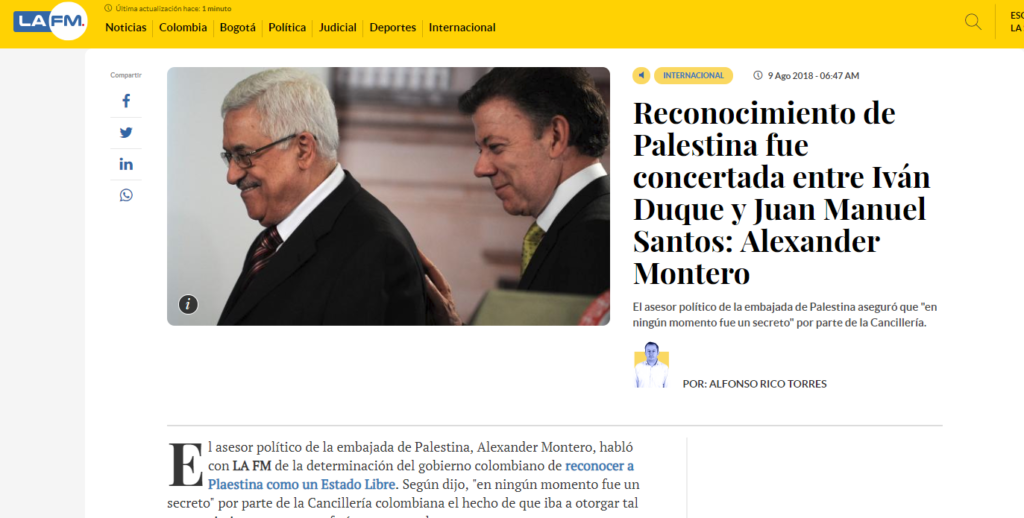
Instead, just one day after Duque’s inauguration on Tuesday, news emerged that the outgoing government had quietly recognized a Palestinian state, leaving Israeli diplomats angry and puzzled.
What had happened? Here’s a quick chronological overview:
• On May 16, candidate Duque declared at a campaign event that, if elected, he would consider “the possibility of placing the diplomatic seat in Jerusalem.” A few days later, he downplayed his statement, saying he supports a two-state solution and wants Colombia to contribute to peace efforts.
• On June 17, the right-wing politician won the presidential election, set to replace the incumbent Juan Manuel Santos.
• On July 29, Prime Minister Benjamin Netanyahu announced his plan to attend the new president’s inauguration in Bogota.
• Less than a week later, on August 2, Netanyahu canceled the trip, citing the volatile security situation in Israel’s south. Instead, Regional Cooperation Minister Tzachi Hanegbi was dispatched to Bogota to represent Israel at the inauguration.
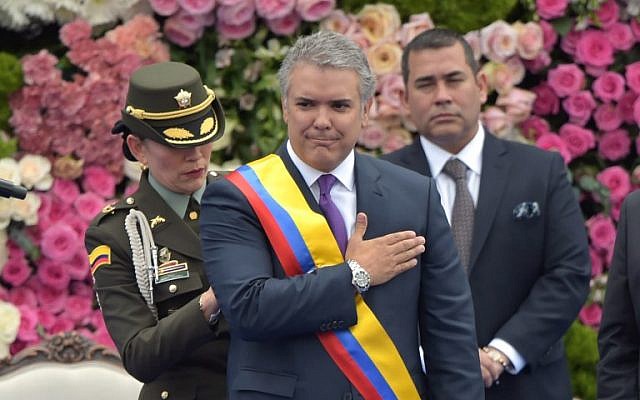
• On August 3, Colombia’s outgoing foreign minister, María Ángela Holguín, sent a letter to Palestinian Authority Foreign Minister Riyad al-Maliki, informing him that her boss had “decided to recognize Palestine as a free, independent and sovereign state.” The outgoing government had informed the new one of its plans, but both kept them from the public until after Duque’s August 7 inauguration.
• On August 8, news of Colombia’s recognition of Palestine was leaked to the media.
It didn’t take long for the issue to make international headlines, although both Jerusalem and Ramallah reacted very cautiously. Neither side made grandiose declarations, as if they were both very aware that this bizarre episode could still turn out differently.
The Israeli embassy in Bogota, however, issued an angry statement in Spanish, saying it was “very surprised and deeply disappointed,” not only by the fact that the government recognized Palestine, but also “by the way it was done.”
This was no way to treat a close ally, the embassy statement fumed, demanding that Colombia’s new government reverse the decision.
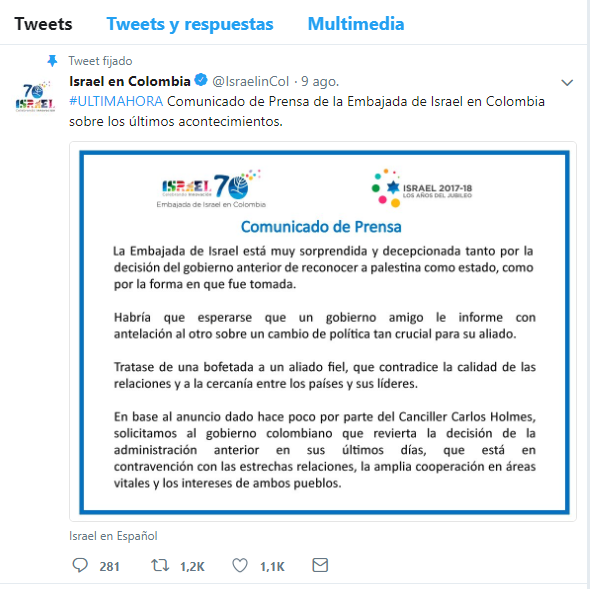
The incoming vice president and foreign minister issued statements to the effect that the Palestine recognition was done legally, but that the new government would review the decision. In deciding what to do next, it would take two aspects into consideration, Foreign Minister Carlos Holmes Trujillo said Wednesday: international law, and Colombia’s foreign relations.
The new government initially seemed to suggest that it was surprised to learn that its predecessor had recognized Palestine in its very last days. But Holguín, the outgoing foreign minister, said in a television interviewthat Duque, the new president, was not only informed but gave his blessing to the demarche.
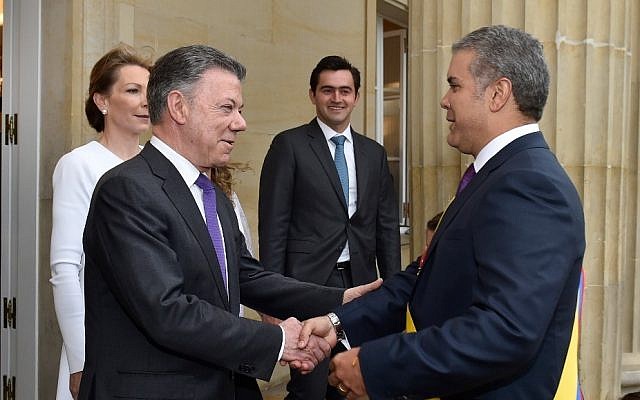
via AP)
On Thursday, Trujillo, the new foreign minister, confirmed that he and Duque knew about the Palestine recognition, but added that “in light of possible omissions” in the way the decision was made, the incoming government “will carefully examine its implications and act in accordance with international law.”
Later that day, Vice President Marta Lucía Ramírez met with Israel’s ambassador in Bogota, Marco Sermoneta, listened to his complaints and promised to convey them to Duque. She also reiterated that Colombia values the “strategic importance” of its ties with Israel.
Confused? So too, apparently, was the Foreign Ministry in Jerusalem, which for 16 hours refused to give Israeli reporters a statement or background information about the move.
The fact that ministry spokesperson Emmanuel Nahshon did not even provide reporters with a Hebrew translation of the Bogota embassy’s angry statement led Israel’s Diplomatic Correspondents’ Association to send him a formal protest letter.
A few hours later, Nahshon issued this laconic statement: “We are surprised about the report in the media and are waiting to receive explanations from the new government, which is looking into the matter.”
Israel was clearly caught off-guard by Colombia’s move.
The fact that Hanegbi, the minister representing Jerusalem at Duque’s inauguration, happily gave television interviews and said he wished Santos “good luck,” was just one indication of how clueless Israel was about the coming storm.
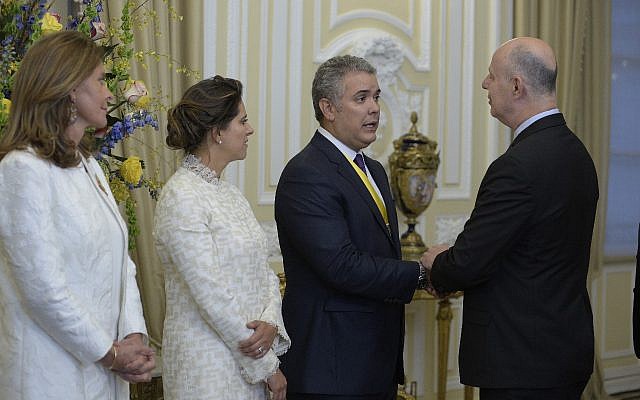
To be fair, there was no reason for suspicion. For years, Colombia had been Israel’s most reliable friend in South America.
When 138 countries voted in favor of granting “Palestine” observer state status at the UN General Assembly in 2012, Colombia abstained. When 128 countries voted to condemn the US administration’s recognition of Jerusalem as Israel’s capital last year, Colombia abstained. Indeed, until last week, Colombia was the only South American country that refused to unilaterally recognize Palestine.
As a thank-you for the longstanding support, Netanyahu last September became the first Israeli prime minister to visit the country.
“Under your leadership in recent years it’s been a remarkable alliance [between Israel and Colombia] of faith and values, faith in the future,” Netanyahu told Santos in Bogota’s Narino presidential palace.
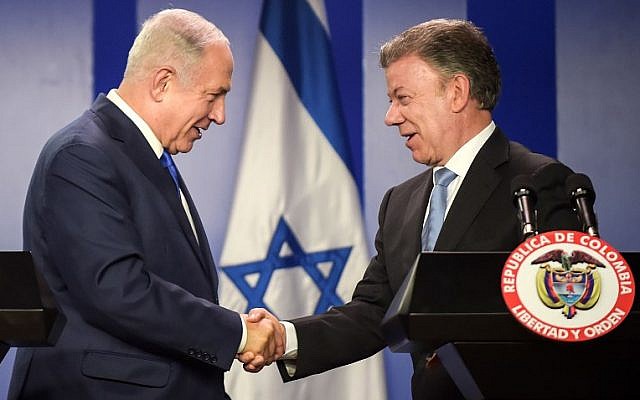
Less than a year later, Santos blindsided the Israeli leader by stealthily recognizing Palestine.
Why he did that befuddles even veteran observers of Israel-Colombia ties.
“Given Israel’s very strong ties with Colombia, it is surprising that Santos made such an important policy decision days before leaving office and basically in secret,” said Leah Soibel, the CEO of Fuente Latina, a nonprofit seeking to improve relations between the Jewish state and the Spanish-speaking world.
“Colombia has a sizable Arab community, mostly of Lebanese descent. Many hold important positions of power and some are engaged in BDS [Boycott, Divest and Sanctions] efforts on the ground. They could have been a factor in Santos’ decision,” she speculated.
A Palestinian source, who spoke to The Times of Israel on condition of anonymity, offered a different explanation.
“It’s about legacy,” he said.
Santos, who won the 2016 Nobel Peace Prize for his role in ending Colombia’s 50-year-long civil, was often asked about his position on the Israeli-Palestinian conflict, the source said.
“Yes, Santos is a friend of Netanyahu, but he agreed that Netanyahu doesn’t do anything to advance peace. That’s why he decided it was time to recognize Palestine.”
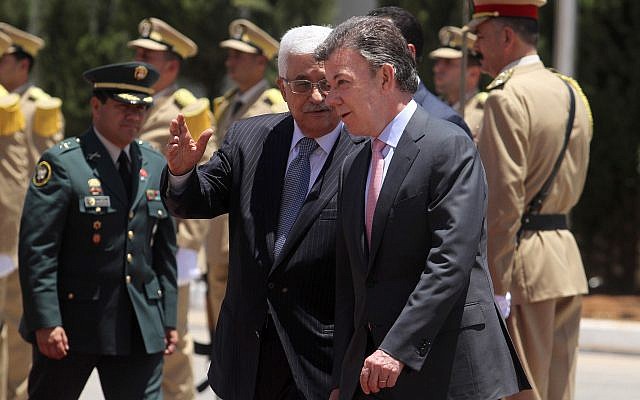
Santos’s move merited only a subdued reaction in Ramallah because it is still unclear what the new government will do, the Palestinian source explained. “The new foreign minister said they will review the decision based on international law. That’s good for us, because there are enough international precedents showing there’s no problem with recognizing Palestine. But he also said they will consider Colombia’s relations with its close allies, by which he means the US and Israel.”
It is no simple matter to withdraw the recognition of a country once it has been formally extended. On the other hand, Israel, and perhaps even the US, might pressure Duque to do just that.
At this point, only one thing seems certain: once Israeli diplomats recover from this week’s shock, they will do everything to persuade the man who less than three months ago talked about relocating his country’s embassy to Jerusalem to at least restore the status quo ante.

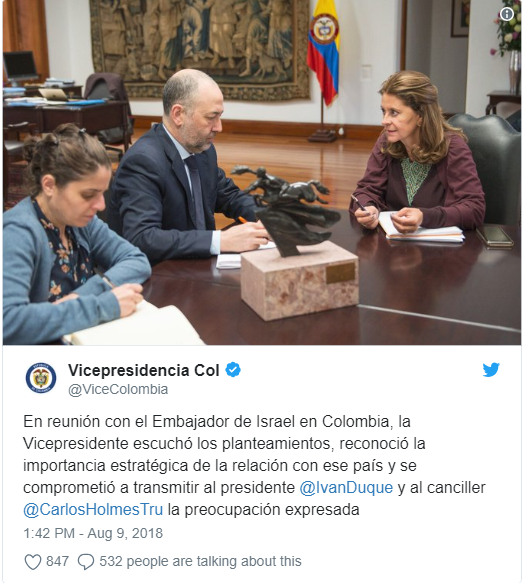

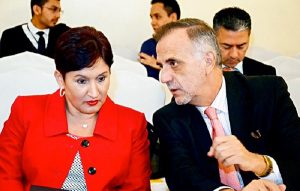


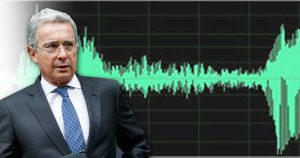
Comentarios